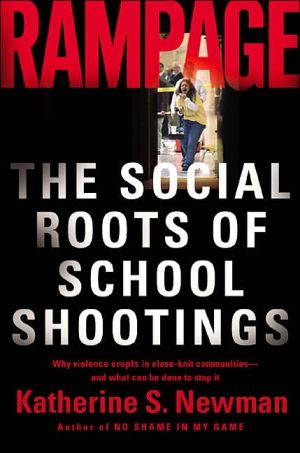

 |

|

The average rating for Rampage: The Social Roots of School Shootings based on 2 reviews is 3.5 stars.
Review # 1 was written on 2008-03-24 00:00:00 Bruno Volk Bruno VolkHere's something not to admit in public: I'm fascinated by school shootings. Not because I love violence; I detest it. But because it seems such a clear indicator that something is systemically wrong, in the most general sense. Of course, no one ever comes to this conclusion, they always think that it's just a couple of "loser" kids acting up. This book shows that there's more to the story than just the psychological predispositions of the shooters. There's a cultural impetus at work, inside and outside of the schools. Unfortunately, the book doesn't quite get to the bottom of things, due to, in my opinion, over-shooting the mark in an zealous attempt for objectivity. |
Review # 2 was written on 2016-10-31 00:00:00 Mark Ezell Mark Ezell"On December 2, 1998, a year and a day after the shooting, the James, the Stegers, and the Hadleys filed civil suits in Paducah against those they held responsible for their daughters' deaths. Among their targets were: Michael Carneal, his parents, the neighbor from whom Michael had stolen the guns, students who had seen Michael with a gun at school before the shooting, students who had heard that something was going to happen on Monday, students who might have been involved as conspirators, teachers and principals at Heath High and Middle schools, the producers of the film The Basketball Diaries, the makers of the "point-and-shoot" video games that Michael played, and the Internet pornography sites he had visited." I felt like the book made important points, and I want to remember them well, so this review will be more about remembering what I am taking for it, but a lot of it comes down to the above quote. That list sounds more like lashing out than a reasonable lawsuit, but there is a point to it. Many of those listed could have had a part in the shooting - even their daughters could have contributed in some way - but no one of them had sole culpability. The authors concluded that there is a combination of five factors that go into school shootings. They presence of all five does not guarantee a shooting, but they seem to have been present for both the two specifically covered and others looked at. 1. "The first necessary factor is the shooter's perception of himself as extremely marginal in the social worlds that matter to him." - He may be relatively well-liked, but not feel important to the group. This was interesting to me because bullying is often brought up, but some shooters are not known to have been bullied, and some have done some bullying themselves. If they have firm social ties and feel well-connected, they may be better able to get past that. This also gives a reason for why the shootings happen in more rural areas. In cities there are more opportunities to find a group where you fit in. 2. "Second, school shooters must suffer from psychosocial problems that magnify the impact of marginality." While not all of the shooters could be definitively described as mentally ill, there were factors that would hamper the building of resilience. While "adverse childhood experiences" were not specifically mentioned, reading on that fits right in. 3. "Cultural scripts -- prescriptions for behavior -- must be available to lead the way toward an armed attack." The Basketball Diaries, Natural Born Killers, and Rage have all been implicated in specific school shootings, but after some are publicized they add to the available scripts. Children will take ideas for solutions to their problems from media - and that is normal. It doesn't mean that they should never watch anything violent, but it is crucial that it's not the only type of solution that they ever see. One phrase that was never mentioned was toxic masculinity, but it plays a huge role. 4. "The fourth necessary factor is a failure of surveillance systems that are intended to identify troubled teens before their problems become extreme." Concerns about teen privacy affect transfer of records, kids who hear things don't want to be snitches, and even adults who see things can easily brush them off. I have noticed that some middles schools seem to work on having more teacher consistency to allow more continuity, which seems like it could help. 5. "Finally, we come to gun availability." The Jonesboro shooters initially tried to take their guns from a parental home, but could not get the locked guns out. They went to a grandparent's home next. There the guns were secured by a cable, which they cut. It's hard not to wonder what could have been different if the grandparents had the same kind of lockup. Lots and lots of food for thought in this book. It is pretty academic, but still accessible. Recommended. |
CAN'T FIND WHAT YOU'RE LOOKING FOR? CLICK HERE!!!